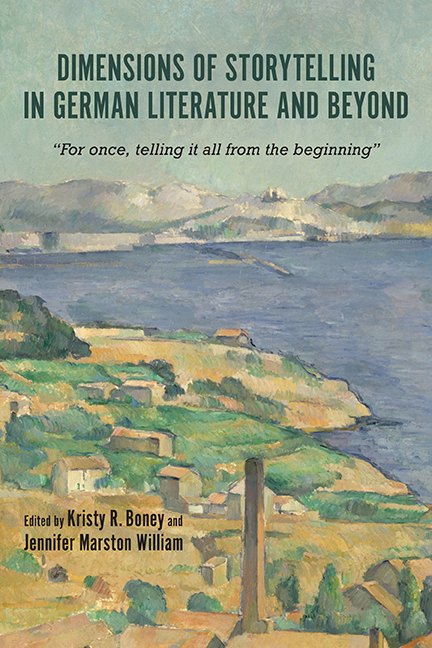 Dimensions of Storytelling in German Literature and Beyond
Dimensions of Storytelling in German Literature and Beyond Book contents
- Frontmatter
- Contents
- Acknowledgments
- Introduction: The Social, Political, and Personal Dimensions of Storytelling
- Part I Anna Seghers: A Missing Piece in the Canon of Modernist Storytellers
- 1 Anna Seghers in Heidelberg: The Formative Years
- 2 Who Is the Narrator? Anna Seghers's “The Excursion of the Dead Girls”: Narrative Mode and Cinematic Depiction
- 3 Anna Seghers's Rubble Literature, 1947–49
- 4 Anna Seghers and the Struggle to Tell Stories about the Nazi Past in the Early German Democratic Republic
- 5 Aufbauzeit or flaue Zeit? Anna Seghers's GDR Novels
- 6 The Time of Decision in Anna Seghers
- 7 Filling the Void with Stories: Anna Seghers's Conceptual Metaphors
- Part II Expressions of Modernity: Using Storytelling Unconventionally
- Part III The Personal Narrative: Storytelling in Acute Historical Moments
- Notes on the Contributors
- Index
4 - Anna Seghers and the Struggle to Tell Stories about the Nazi Past in the Early German Democratic Republic
from Part I - Anna Seghers: A Missing Piece in the Canon of Modernist Storytellers
Published online by Cambridge University Press: 12 April 2019
- Frontmatter
- Contents
- Acknowledgments
- Introduction: The Social, Political, and Personal Dimensions of Storytelling
- Part I Anna Seghers: A Missing Piece in the Canon of Modernist Storytellers
- 1 Anna Seghers in Heidelberg: The Formative Years
- 2 Who Is the Narrator? Anna Seghers's “The Excursion of the Dead Girls”: Narrative Mode and Cinematic Depiction
- 3 Anna Seghers's Rubble Literature, 1947–49
- 4 Anna Seghers and the Struggle to Tell Stories about the Nazi Past in the Early German Democratic Republic
- 5 Aufbauzeit or flaue Zeit? Anna Seghers's GDR Novels
- 6 The Time of Decision in Anna Seghers
- 7 Filling the Void with Stories: Anna Seghers's Conceptual Metaphors
- Part II Expressions of Modernity: Using Storytelling Unconventionally
- Part III The Personal Narrative: Storytelling in Acute Historical Moments
- Notes on the Contributors
- Index
Summary
WHEN ANNA SEGHERS returned to Germany in 1947 and settled in the Soviet zone of occupation, the literary world was already eagerly anticipating her arrival. Seghers's great anti-Nazi novel Das siebte Kreuz (The Seventh Cross), which had appeared in Mexico in 1943 and in the United States a year later, was considered so important for postwar German literature that the country's leading cultural-political weekly, Sonntag, had begun publishing it in serialized form in its first issue, on July 7, 1946. The novel dominated subsequent issues of the newspaper for most of the rest of the year, finally reaching its conclusion—the famous words “All of us felt how ruthlessly and fearfully outward powers could strike to the very core of man, but at the same time we felt that at the very core there was something that was unassailable and inviolable”—on December 15.
Partly as a result of the fame of this novel, Seghers was hailed as a genius when she arrived in Germany less than a year later. In the pages of Die Weltbühne, a key literary-cultural biweekly that had been intentionally (re)created to remind its readers of the Weimar-era journal of the same title, the former anti-Nazi resistance fighter and writer Jan Petersen, a long-time comrade of Seghers, called her the “shaper of our era” and proclaimed that the role of a writer with such creative power would be crucial for serving the cause of “truth and bringing it closer to people.” Seghers's work, he believed, could, “for hundreds of thousands … for millions of readers, make the confusions of our chaotic era clearly visible, thus transforming the seemingly insoluble into a profound, path-breaking understanding, which” would be “the only basis for conscious and intentional action.” The editors of Die Weltbühne greeted Seghers's arrival in Germany enthusiastically and declared Petersen's article to be not only the first overview of the writer's work ever published but a necessary response to the problem that, at this point, few members of the German reading public had access to Seghers's writing of the previous twelve years, since books by Seghers had been banned during the Nazi period.
- Type
- Chapter
- Information
- Dimensions of Storytelling in German Literature and Beyond“For once, telling it all from the beginning”, pp. 55 - 69Publisher: Boydell & BrewerPrint publication year: 2018
- 1
- Cited by
